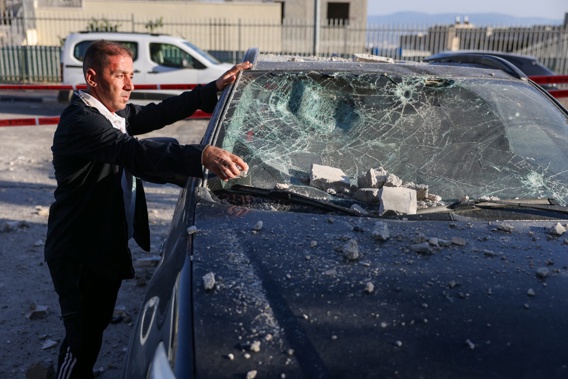
- Israel is preparing a significant response to Iran’s missile strikes, promising consequences for Tehran.
- US President Joe Biden opposes Israel targeting Iran’s oil production or nuclear programme.
- Tomorrow is the anniversary of Hamas’ October 7 attacks, which claimed the lives of 1200 people in Israel.
Israel is preparing a “serious and significant” response to Iran’s missile strikes around the anniversary of the October 7 attacks.
The Israel Defence Forces said Iran’s barrage last week of 200 ballistic missiles, some of which hit airbases, would “have consequences”.
Military officials did not give any timescale for the retaliation, but told Israeli media that they were in the middle of preparations and devoting significant resources to the plan.
The comments echoed Israeli Prime Minister Benjamin Netanyahu’s statement in the aftermath of the barrage that Tehran had made a “big mistake” and “will pay for it”.
As Israel weighs its options, its next moves are being keenly watched in world capitals, with many fearing the Middle East is sliding into an escalating war.
Biden has signalled he is opposed to Israel hitting either Iran’s oil production or its nuclear programme.
US President Joe Biden (right), pictured here with Israeli Prime Minister Benjamin Netanyahu, has signalled he is opposed to Israel hitting either Iran’s oil production infrastructure or nuclear programme. Photo / Getty Images
Former US president Donald Trump, currently running to return to the White House and replace Biden, earlier this week said he believed the president had got it wrong and urged Tel Aviv to strike at Iran’s nuclear programme.
He said: “They asked him, ‘What do you think about Iran, would you hit Iran?’ And he goes, ‘As long as they don’t hit the nuclear stuff’. That’s the thing you want to hit, right?
“I think he’s got that one wrong. Isn’t that what you’re supposed to hit? I mean, it’s the biggest risk we have, nuclear weapons.
“When they asked him that question, the answer should have been, ‘Hit the nuclear first and worry about the rest later’.”
 Donald Trump, running to return to the White House, earlier this week urged Tel Aviv to strike at Iran’s nuclear programme. Photo / Getty Images
Donald Trump, running to return to the White House, earlier this week urged Tel Aviv to strike at Iran’s nuclear programme. Photo / Getty Images
Israel has not given the White House any assurances a strike on Iran’s nuclear facilities is off the table, according to senior US diplomats.
A top US state department official also told CNN it was “really hard to tell” if Israel intended to use the anniversary of Hamas’ October 7 attacks, which claimed the lives of 1200 people in Israel, to strike back.
The official said the White House hoped to “see some wisdom as well as strength” in Israel’s retaliation, but there were “no guarantees”.
They said: “I think in some ways they would want to avoid the seventh, so in my estimation, if there is anything it would likely be before or after.”
 A man clears debris from a car damaged during a rocket attack from southern Lebanon that targeted the northern Arab-Israeli village of Deir al-Asad yesterday. Photo / AFP
A man clears debris from a car damaged during a rocket attack from southern Lebanon that targeted the northern Arab-Israeli village of Deir al-Asad yesterday. Photo / AFP
At least two dozen Iranian missiles managed to break through Israel’s air defences and hit or land near at least three military and intelligence sites, the Washington Post reported.
Missiles hit the Nevatim and Tel Hof airbases and came close to the headquarters of Israel’s Mossad spy agency in Glilot.
Syrian President Bashar al-Assad said Iran’s barrage had been a “lesson” for Israel as Abbas Araghchi, Iran’s foreign minister, visited Damascus.
However, Araghchi indicated his country wanted to de-escalate the situation.
He said: “The most important issue today is the ceasefire, especially in Lebanon and in Gaza.”
“There are initiatives in this regard, there have been consultations that we hope will be successful.”
Israel on Saturday, meanwhile, continued its bombardment of Lebanon, hitting Beirut’s southern suburbs with a dozen airstrikes and striking a Palestinian refugee camp deep in the north for the first time, as it targeted both Hezbollah and Hamas fighters.
Israel’s attack on the Beddawi camp near Tripoli killed an official with Hamas’ military wing along with his wife and two young daughters, the Palestinian militant group said.
Hamas later said another military wing member was killed in an Israeli strike in Lebanon’s eastern Bekaa Valley.
As the onslaught continued, there was also growing evidence Israel may have killed the man tipped to succeed assassinated Hezbollah leader Hassan Nasrallah.
Three Lebanese security sources told Reuters Hashen Safieddine had been unreachable since he was reportedly targeted in an Israeli strike on Friday.
Ronen Solomon, an Israeli intelligence and defence analyst who has worked for over a decade in the Ministry of Defence, said the hit on Safieddine, who was serving as part of the group’s executive council, which oversees the military operations and civilian structure, paves the way for more to come.
“Safieddine is well-known as number two in the pyramid. But now his deputy, Sheikh Ali Damoush, the commander of the foreign relations unit, hasn’t been killed yet, so maybe he will be next on the blacklist,” he told the Telegraph.
Safieddine’s brother Abdullah oversees Quds Force and Islamic Revolutionary Guard Corps relations and is deeply entrenched in Iran’s political and military elite, based in Tehran.
“Abdullah is also a possible target,” added Solomon. “He is well-known as the head of the business unit of Hezbollah, connected to the external relationship unit and is the connection man between Iran and Hezbollah.”
In 2017, the US treasury added Safieddine to its counter-terrorism blacklist.
“He was more extreme than Nasrallah,” added Solomon, comparing Nasrallah’s apparent successor to the ageing leader killed in an airstrike last month.
“Nasrallah was very realistic about Israel and took decisions step by step. Safieddine was much more unpredictable and took his lead from the commanders of the Radwan Force,” Solomon said.
The Israeli army also warned residents to evacuate part of central Gaza on Saturday, saying it was preparing to use “great force” against Hamas fighters.
The evacuation call is the first in weeks for Gaza as the Israeli military has largely shifted its focus to fighting Hezbollah in Lebanon.
French President Emmanuel Macron has urged a halt to arms deliveries to Israel amid growing criticism over how it is conducting its retaliatory operation in Gaza.
“I think that today, the priority is that we return to a political solution, that we stop delivering weapons to fight in Gaza,” Macron said, adding France was not sending any arms to Israel.
Take your Radio, Podcasts and Music with you









